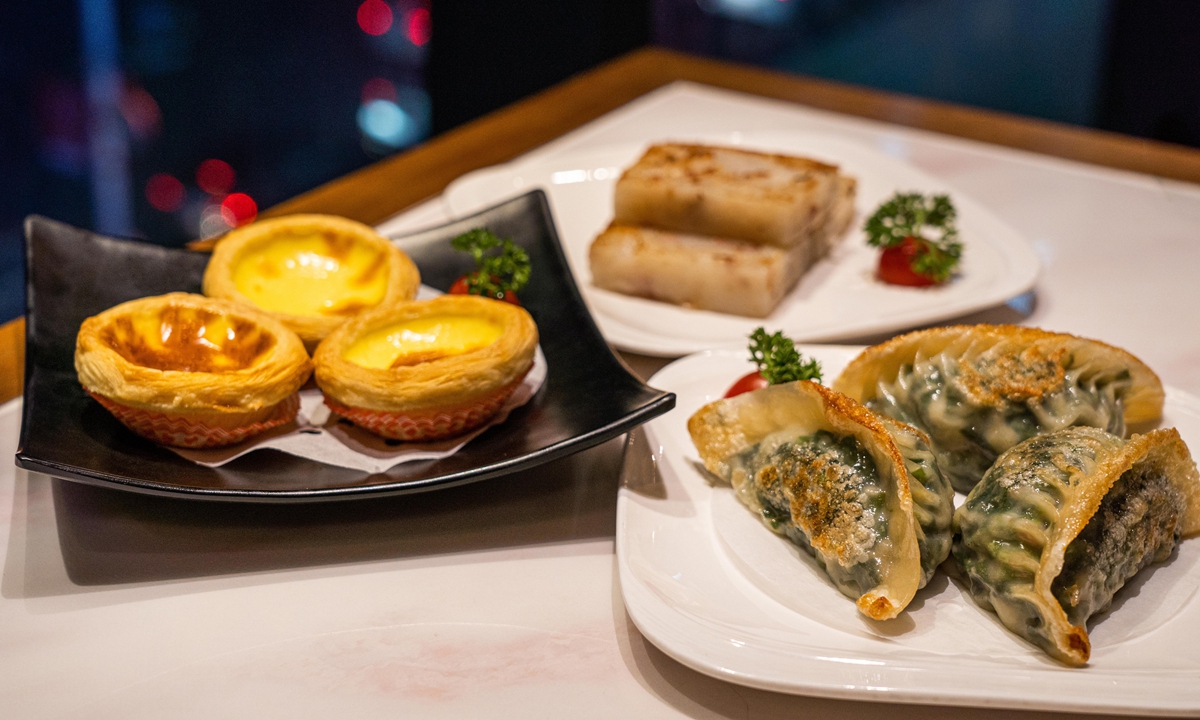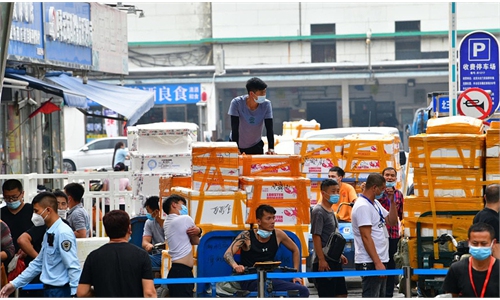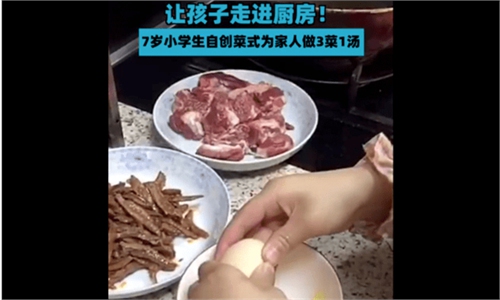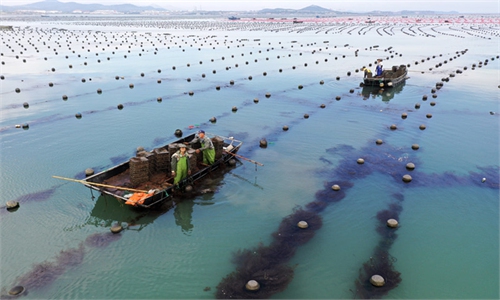ARTS / CULTURE & LEISURE
Macao’s old food stores seek new development
Preserving tradition

Delicious food from China's Macao Special Administrative Region. Photo: VCG

Staff make macaroons in a shop in China's Macao Special Administrative Region. Photo: VCG
Selling a number of delicacies ranging from staple food and snacks to dairy and tea, the many famous stores located at different spots in the old town area of the Macao Peninsula have become the calling card for traditional food and unique souvenirs in China's Macao Special Administrative Region (SAR).Old ways of making food
Tam Soi Wing is the third-generation inheritor of Pastelaria Chui Heong, a pastry shop known for its hand-made char-grilled almond cookies on the narrow yet bustling Rua do Gamboa street.
"At the beginning, my grandfather made the cookies and my grandmother carried a load around to sell them. In the 1970s, my mother and uncle took over and bought a shop. In 2020, sponsored by the SAR government, I bought this new shop and the old one was turned into a factory," she told Xinhua.
Labeled as a typical old shop in Macao, Chui Heong has carried on the tradition of experienced master workers by mixing raw materials, molding them, and grilling them on a char fire, all by hands. A tourist surnamed Su from Guangzhou, South China's Guangdong Province, said she came to Chui Heong particularly for the hand-made pastries.
"It took me a long time to find the store," she said. "I like pastries made in the traditional way."
Not far from Chui Heong sits Lok Kei Noodles, a Michelin guide restaurant for 12 years. The inconspicuous restaurant is famous among locals and tourists alike, offering its brand bamboo-pressed noodles and crab congee.
Lei Man Lung is the third-generation inheritor of Lok Kei. Sitting on a giant bamboo rod, Lei jumps up and down for nearly an hour to make the bamboo rod flatten a flour dough with nearly 10,000 times of repeated pressing.
"Making bamboo-pressing noodles requires great efforts," Lei said. "But it helps make the noodles smoother, more elastic, and therefore more tasty."
Also in the area, Lan Heong Kuok, a typical Cantonese tea house, is crowded with customers during peak time, who come specially for the traditional dim sum at attractive prices.
"My father founded the restaurant 59 years ago," said Chan Zi Wai. "In the old days, customers liked reading newspapers here. Now they like checking on their mobile phones. Most other things remain unchanged."
Shortly before the Dragon Boat Festival, which falls on June 3 this year, the restaurant has been busy selling zongzi, a festive food made of glutinous rice stuffed with different fillings and wrapped with bamboo or reed leaves.
Each year by this time, the first floor of the three-story building is turned into a workshop. Employees make zongzi on site with fillings of pork, beans and salted egg yolk, and hang their products on iron racks for display.
"We sell tens of thousands of zongzi for each Dragon Boat Festival," said Chan. The glutinous "giants", each weighing over 500 grams on average, are priced from 16 patacas ($ 1.98) to 100 patacas.
New thoughts on future development
With decades or even centuries of history, these old food stores are now faced with new challenges, especially with the impacts from the COVID-19 pandemic.
Since the COVID-19 outbreak in early 2020, the number of tourists to Macao has fallen sharply, dealing a blow to small and micro businesses. Official data showed visitor arrivals in Macao totaled over 7.7 million in 2021, an increase of 30.7 percent year on year and yet a decline of over 80 percent compared to 2019.
"There were long queues in front of our store at the best of times," said Tam, whose pastry products are mostly bought by tourists as souvenirs.
"Now, due to the pandemic, we have fewer customers."
Trying to be more innovative, Chui Heong now offers small packages of pastries aiming to attract young customers. "We are also thinking about selling online to mainland customers," Tam said.
To Lei, the solution is to make traditional foods more tailored to the tastes of modern customers. The Michelin guide restaurant has invented new dishes by adding dried shrimps, cured pork and dried citrus peels into fish paste, making the mixing into ball shapes, and frying them. "Many tourists from Guangdong really like coming to us," Lei said.
However, Lei now faces another challenge, inheritance, as making bamboo-pressed noodles not only requires great physical strength, but is also difficult to be adept at.
According to the Cultural Affairs Bureau of the Macao SAR, only a few restaurants in Macao currently make bamboo-pressed noodles. In 2020, the bureau listed the skill as intangible cultural heritage of the SAR.
"My grandfather did the business to make a living," Lei said. "To my generation, it's about keeping the family reputation and inheriting the skill."
Chan, now 65, runs Lan Heong Kuok together with his two elder sisters. "Our children don't want to take over," he said.



